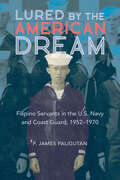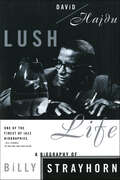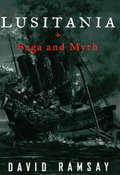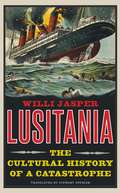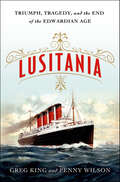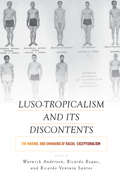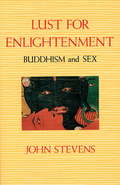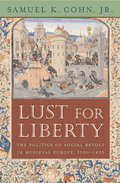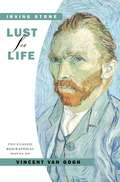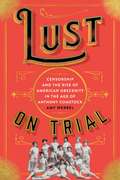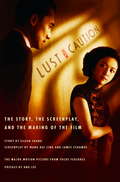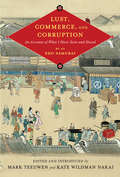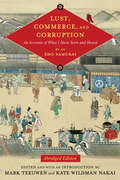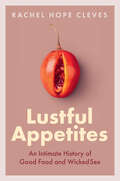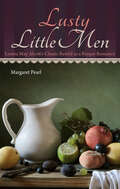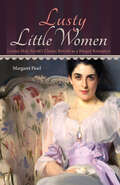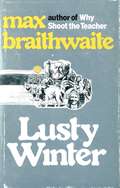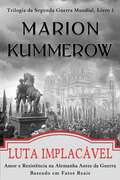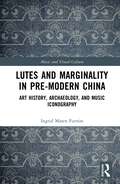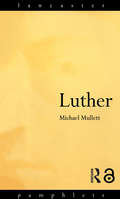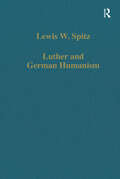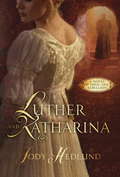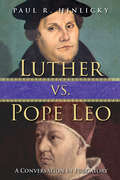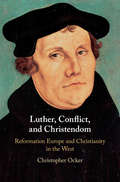- Table View
- List View
Lured by the American Dream: Filipino Servants in the U.S. Navy and Coast Guard, 1952-1970 (Asian American Experience)
by P. James PaligutanStarting in 1952, the United States Navy and Coast Guard actively recruited Filipino men to serve as stewards--domestic servants for officers. Oral histories and detailed archival research inform P. James Paligutan's story of the critical role played by Filipino sailors in putting an end to race-based military policies. Constrained by systemic exploitation, Filipino stewards responded with direct complaints to flag officers and chaplains, rating transfer requests that flooded the bureaucracy, and refusals to work. Their actions had a decisive impact on seagoing military’s elimination of the antiquated steward position. Paligutan looks at these Filipino sailors as agents of change while examining the military system through the lens of white supremacy, racist perceptions of Asian males, and the motives of Filipinos who joined the armed forces of the power that had colonized their nation. Insightful and dramatic, Lured by the American Dream is the untold story of how Filipino servicepersons overcame tradition and hierarchy in their quest for dignity.
Lush Life: A Biography of Billy Strayhorn
by David Hajdu&“Arguably the finest biography yet written about a jazz musician . . . [It] will fascinate readers who have never heard a note of Strayhorn&’s music.&” —Joel E. Seigel, Washington City Paper A finalist for the National Book Critics Circle Award Billy Strayhorn (1915–67) was one of the greatest composers in the history of American music, the creator of a body of work that includes such standards as &“Take the &‘A&’ Train.&” Yet all his life Strayhorn was overshadowed by his friend and collaborator Duke Ellington, with whom he worked for three decades as the Ellington Orchestra&’s ace songwriter and arranger. A &“definitive&” corrective (USA Today) to decades of patchwork scholarship and journalism about this giant of jazz, David Hajdu&’s Lush Life is a vibrant and absorbing account of the &“lush life&” that Strayhorn and other jazz musicians led in Harlem and Paris. While composing some of the most gorgeous American music of the twentieth century, Strayhorn labored under a complex agreement whereby Ellington took the bows for his work. Until his life was tragically cut short by cancer and alcohol abuse, the small, shy composer carried himself with singular style and grace as one of the few jazzmen to be openly homosexual. Lush Life has sparked an enthusiastic revival of interest in Strayhorn&’s work and is already acknowledged as a jazz classic. &“A book as beautiful and intelligent as its subject. David Hajdu has brought all my dear memories of Billy Strayhorn to life.&” —Lena Horne &“It is a mark of excellence of this biography that it leaves one wanting nothing so much as to listen to the music.&” —Jonathan Yardley, The Washington Post Book World
Lusitania: Saga and Myth
by David RamsayAn objective and enthralling account of the sinking of the Lusitania, which unravels many of the myths and, for the first time, explains the true significance of that terrible disaster. The saga of the Lusitania is one of the most remarkable in the annals of maritime history. State-of-the-art when she went into service and the first express liner to be equipped with steam turbines, she outclassed all her rivals. She triumphantly restored British supremacy on the North Atlantic passenger routes and became an acknowledged commercial success; she was highly popular with her regular passengers. Her sinking in May 1915 by a German U-boat, with heavy loss of life, was at that time the most savage attack on civilians in the course of war, and was widely denounced in allied and neutral countries. From that day her loss has become encrusted with legends (including conspiracy theories), many of them created by German propaganda. In this new book David Ramsay has unraveled those myths and legends and tells a clear and compelling saga of terrible maritime disaster and clashes among three powerful nations. It is a story of potentates and presidents, ambassadors and ministers of state, bankers, shipping magnates, spies, and, not least, Captain William Turner, who had to defend himself against charges of incompetence and fight for his reputation. Based on detailed research, this new book almost certainly contains the most objective account of the history of the liner and the circumstances surrounding her sinking. The sinking of Lusitania, which took a mere eighteen minutes, led to a loss of life comparable with the Titanic disaster, and the ramifications were felt across Europe and America; this masterly telling of the story will intrigue the general reader as much as it does the historian and enthusiast.
Lusitania: The Cultural History of a Catastrophe
by Willi Jasper Mr Stewart SpencerA fascinating reassessment of a turning point in the First World War, revealing its role in shaping the German psyche On May 7, 1915, the Lusitania, a large British luxury liner, was sunk by a German submarine off the Irish coast. Nearly 1,200 people, including 128 American citizens, lost their lives. The sinking of a civilian passenger vessel without warning was a scandal of international scale and helped precipitate the United States' decision to enter the conflict. It also led to the immediate vilification of Germany. Though the ship's sinking has preoccupied historians and the general public for over a century, until now the German side of the story has been largely untold. Drawing on varied German sources, historian Willi Jasper provides a comprehensive reappraisal of the sinking and its aftermath that focuses on the German reaction and psyche. The attack on the Lusitania, he argues, was not simply an escalation of violence but signaled a new ideological, moral, and religious dimension in the struggle between German Kultur and Western civilization.
Lusitania: Triumph, Tragedy, and the End of the Edwardian Age
by Greg King Penny WilsonOn the 100th Anniversary of its sinking, King and Wilson tell the story of the Lusitania's glamorous passengers and the torpedo that ended an era and prompted the US entry into World War I.Lusitania: She was a ship of dreams, carrying millionaires and aristocrats, actresses and impresarios, writers and suffragettes – a microcosm of the last years of the waning Edwardian Era and the coming influences of the Twentieth Century. When she left New York on her final voyage, she sailed from the New World to the Old; yet an encounter with the machinery of the New World, in the form of a primitive German U-Boat, sent her – and her gilded passengers – to their tragic deaths and opened up a new era of indiscriminate warfare.A hundred years after her sinking, Lusitania remains an evocative ship of mystery. Was she carrying munitions that exploded? Did Winston Churchill engineer a conspiracy that doomed the liner? Lost amid these tangled skeins is the romantic, vibrant, and finally heartrending tale of the passengers who sailed aboard her. Lives, relationships, and marriages ended in the icy waters off the Irish Sea; those who survived were left haunted and plagued with guilt.Authors Greg King and Penny Wilson resurrect this lost, glittering world to show the golden age of travel and illuminate the most prominent of Lusitania's passengers. Rarely was an era so glamorous; rarely was a ship so magnificent; and rarely was the human element of tragedy so quickly lost to diplomatic maneuvers and militaristic threats.
Luso-Tropicalism and Its Discontents: The Making and Unmaking of Racial Exceptionalism
by Warwick Anderson Ricardo Ventura Santos Ricardo RoqueModern perceptions of race across much of the Global South are indebted to the Brazilian social scientist Gilberto Freyre, who in works such as The Masters and the Slaves claimed that Portuguese colonialism produced exceptionally benign and tolerant race relations. This volume radically reinterprets Freyre’s Luso-tropicalist arguments and critically engages with the historical complexity of racial concepts and practices in the Portuguese-speaking world. Encompassing Brazil as well as Portuguese-speaking societies in Africa, Asia, and even Portugal itself, it places an interdisciplinary group of scholars in conversation to challenge the conventional understanding of twentieth-century racialization, proffering new insights into such controversial topics as human plasticity, racial amalgamation, and the tropes and proxies of whiteness.
Lust for Enlightenment: Buddhism and Sex
by John StevensOver the centuries, Buddhism has responded to sexuality in a variety of fascinating ways, sometimes suppressing the sexual urge, sometimes sublimating it, sometimes cultivating it, and, on the highest levels, transforming it. This book reveals how Buddhists, beginning with Shakyamuni Buddha himself, relate to the "inner fire" that drives humankind. Included are chapters on the Buddha's love life before his enlightenment and his later relationships with women; the tantric approach to sex among Buddhists of ancient India, Tibet, China, and Japan; Zen in the art of love; and a positive discussion of women and Buddhism.
Lust for Gold
by Dale ChaseIn 1849 the promise of gold brings many a man to California, but most find more hardship than riches.Jesse Quinn, a golden-haired twenty-year-old is among them. He settles into the gold camp of Whiskey Slide to work with two other men in an effort that barely yields enough to keep them alive. With merchants charging exorbitant prices for provisions, it’s said men dig for food, not gold.After hardship and disappointment, Jesse moves to another camp, Dutch Flat, where he takes up with the stern and silent Abel Munday. As the two work Abel’s claim with success, things take a positive turn for Jesse. Can Jesse bring some light into the darkness that’s plagued Abel much of his life? Together, they just might be able to fine something richer than gold.
Lust for Liberty: The Politics of Social Revolt in Medieval Europe, 1200-1425
by Samuel K. Cohn Jr.Lust for Liberty challenges long-standing views of popular medieval revolts. Comparing rebellions in northern and southern Europe over two centuries, Samuel Cohn analyzes their causes and forms, their leadership, the role of women, and the suppression or success of these revolts. Popular revolts were remarkably common--not the last resort of desperate people. Leaders were largely workers, artisans, and peasants. Over 90 percent of the uprisings pitted ordinary people against the state and were fought over political rights--regarding citizenship, governmental offices, the barriers of ancient hierarchies--rather than rents, food prices, or working conditions. After the Black Death, the connection of the word "liberty" with revolts increased fivefold, and its meaning became more closely tied with notions of equality instead of privilege. The book offers a new interpretation of the Black Death and the increase of and change in popular revolt from the mid-1350s to the early fifteenth century. Instead of structural explanations based on economic, demographic, and political models, this book turns to the actors themselves--peasants, artisans, and bourgeois--finding that the plagues wrought a new urgency for social and political change and a new self- and class-confidence in the efficacy of collective action.
Lust for Life: The Story of Vincent Van Gogh
by Irving StoneThe Classic Biographical Novel of Vincent Van Gogh by the Master Storyteller of Our Times Since its initial publication in 1934, Irving Stone's Lust for Life has been a critical success, a multimillion-copy bestseller, and the basis for an Academy Award-winning movie. The most famous of all of Stone's novels, it is the story of Vincent Van Gogh-brilliant painter, passionate lover, and alleged madman. Here is his tempestuous story: his dramatic life, his fevered loves for both the highest-born women and the lowest of prostitutes, and his paintings-for which he was damned before being proclaimed a genius. The novel takes us from his desperate days in a northern coal mine to his dazzling years in the south of France, where he knew the most brilliant artists (and the most depraved whores). Finally, it shows us Van Gogh driven mad, tragic and triumphant at once. No other novel of a great man's life has so fascinated the American public for generations.
Lust on Trial: Censorship and the Rise of American Obscenity in the Age of Anthony Comstock
by Amy WerbelAnthony Comstock was America’s first professional censor. From 1873 to 1915, as Secretary of the New York Society for the Suppression of Vice, Comstock led a crusade against lasciviousness, salaciousness, and obscenity that resulted in the confiscation and incineration of more than three million pictures, postcards, and books he judged to be obscene. But as Amy Werbel shows in this rich cultural and social history, Comstock’s campaign to rid America of vice in fact led to greater acceptance of the materials he deemed objectionable, offering a revealing tale about the unintended consequences of censorship.In Lust on Trial, Werbel presents a colorful journey through Comstock’s career that doubles as a new history of post–Civil War America’s risqué visual and sexual culture. Born into a puritanical New England community, Anthony Comstock moved to New York in 1868 armed with his Christian faith and a burning desire to rid the city of vice. Werbel describes how Comstock’s raids shaped New York City and American culture through his obsession with the prevention of lust by means of censorship, and how his restrictions provided an impetus for the increased circulation and explicitness of “obscene” materials. By opposing women who preached sexual liberation and empowerment, suppressing contraceptives, and restricting artistic expression, Comstock drew the ire of civil liberties advocates, inspiring more open attitudes toward sexual and creative freedom and more sophisticated legal defenses. Drawing on material culture high and low, including numerous examples of the “obscenities” Comstock seized, Lust on Trial provides fresh insights into Comstock’s actions and motivations, the sexual habits of Americans during his era, and the complicated relationship between law and cultural change.
Lust, Caution: The Story, the Screenplay, and the Making of the Film
by Eileen Chang Wang Hui LingA major motion picture (2007) from Oscar-winning director Ang Lee (Crouching Tiger, Hidden Dragon; Brokeback Mountain): an intensely passionate story of love and espionage, set in Shanghai during World War II.In the midst of the Japanese occupation of China and Hong Kong, two lives become intertwined: Wong Chia Chi, a young student active in the resistance, and Mr. Yee, a powerful political figure who works for the Japanese occupational government. As these two move deftly between Shanghai’s tea parties and secret interrogations, they become embroiled in the complicated politics of wartime—and in a mutual attraction that may be more than what they expected. Written in lush, lavish prose, and with the tension of a political thriller, Lust, Caution brings 1940s Shanghai artfully to life even as it limns the erotic pulse of a doomed love affair.
Lust, Commerce, and Corruption: An Account of What I Have Seen and Heard, by an Edo Samurai (Translations from the Asian Classics)
by Anne Walthall Kate Wildman Nakai John Breen Trans. Eds. Teeuwen Mark Fumiko UmezawaBy 1816, Japan had recovered from the famines of the 1780s and moved beyond the political reforms of the 1790s. Despite persistent economic and social stresses, the country seemed to be approaching a new period of growth. The idea that the shogunate would not last forever was far from anyone's mind.Yet, in that year, an anonymous samurai author completed one of the most detailed critiques of Edo society known today. Writing as Buyo Inshi, "a retired gentleman of Edo," he expresses a profound despair with the state of the realm and with people's behavior and attitudes. He sees decay wherever he turns and believes the world will soon descend into war.Buyo shows a familiarity with many corners of Edo life that one might not expect in a samurai. He describes the corruption of samurai officials; the suffering of the poor in villages and cities; the operation of brothels; the dealings of blind moneylenders; the selling and buying of temple abbotships; and the dubious strategies townspeople use in the law courts. Perhaps the frankness of his account, which contains a wealth of concrete information about Edo society, made him prefer to remain anonymous.This volume contains a full translation of Buyo's often-quoted but rarely studied work by a team of specialists on Edo society. Together with extensive annotation of the translation, the volume includes an introduction that situates the text culturally and historically.
Lust, Commerce, and Corruption: An Account of What I Have Seen and Heard, by an Edo Samurai, Abridged Edition (Translations from the Asian Classics)
by Kate Wildman Nakai Mark TeeuwenBy 1816, Japan had recovered from the famines of the 1780s and moved beyond the political reforms of the 1790s. Despite persistent economic and social stresses, the country seemed headed for a new period of growth. The idea that the shogunate would not last forever was far from anyone's mind.Yet, in that year, an anonymous samurai produced a scathing critique of Edo society. Writing as Buyo Inshi, "a retired gentleman of Edo," he expressed in An Account of What I Have Seen and Heard a profound despair with the state of the realm. Seeing decay wherever he turned, Buyo feared the world would soon descend into war.In his anecdotes, Buyo shows a sometimes surprising familiarity with the shadier aspects of Edo life. He speaks of the corruption of samurai officials; the suffering of the poor in villages and cities; the operation of brothels; the dealings of blind moneylenders; the selling and buying of temple abbotships; and the dubious strategies seen in law courts. Perhaps it was the frankness of his account that made him prefer to stay anonymous.A team of Edo specialists undertook the original translation of Buyo's work. This abridged edition streamlines this translation for classroom use, preserving the scope and emphasis of Buyo's argument while eliminating repetitions and diversions. It also retains the introductory essay that situates the work within Edo society and history.
Lustful Appetites: An Intimate History of Good Food and Wicked Sex
by Rachel Hope ClevesWe take the edible trappings of flirtation for granted: chocolate covered strawberries and romance, oysters on the half shell and desire, the eggplant emoji and a suggestive wink. But why does it feel so natural for us to link food and sexual pleasure? Rachel Hope Cleves explores the long association between indulging in good food and an appetite for naughty sex, from the development of the Parisian restaurant as a place for men to meet with prostitutes and mistresses, to the role of sexual outlaws like bohemians, new women, lesbians and gay men in creating epicurean culture in Britain and the United States. Taking readers on a gastronomic journey from Paris and London to New York, Chicago and San Francisco, Lustful Appetites reveals how this preoccupation changed the ways we eat and the ways we are intimate―while also creating stigmas that persist well into our own twenty-first century.
Lusty Little Men: Louisa May Alcott's Classic Retold as a Risqué Romance
by Margaret PearlThe author of Lusty Little Women takes on the fellows with a scintillating twist: everyone is all grown up—and willing to shed their inhibitions . . . In this reprise, your favorite characters are a little older and a lot more adventurous, ready to plumb the depths of their previously constrained courtships. Jo with Laurie, Meg with John, Marmee with the old gentleman; all these couplings and more will thrill both well-versed and new fans of Louisa May Alcott&’s classic novel.
Lusty Little Women: Louisa May Alcott's Classic Retold as a Risqué Romance
by Margaret PearlThe secret desires of the March sisters. &“Discover Louisa May Alcott&’s Little Women from a new perspective in this exciting remake of a beloved classic.&” —Foreword Reviews Jo, Meg, Beth, and Amy are coming of age, and stirring temptations await them around every corner. The handsome young neighbor, attentive doctor and mysterious foreigner introduce the little women to the passion-filled world of the feminine arts. Will these steamy encounters fulfill their deepest yearnings? Have they found true love or been blinded by lust? This scintillating twist on Little Women infuses the original text with sexy new scenes that will surprise, arouse and delight. In this reprise, your favorite characters are a little older and a lot more adventurous, ready to plumb the depths of their previously constrained courtships. Jo with Laurie, Meg with John, Marmee with the old gentleman; all these couplings and more will thrill both well-versed and new fans of Louisa May Alcott&’s classic novel.
Luta Implacável - Amor e Resistência na Alemanha Antes da Guerra
by Marcos Anilton Santos Marion KummerowBerlim, Alemanha, 1932. Em uma época de agitação política, um homem encontra a coragem de contra-atacar. O Dr. Wilhem "Q" Quedlin, engenheiro químico e inventor, vive em prol da ciência. Ter uma esposa não estava em seus planos, nem ser acusado de espionagem industrial. Mas a partir desses acontecimentos, a situação mudou. Presenciar a ascensão de Hitler ao poder desperta nele o desejo de evitar outra guerra que destruiria completamente seu país. Q toma a decisão consciente de lutar contra o que sabe que está errado, mesmo se lutar contra os nazistas signifique a morte certa para ele - e para todos que ele ama. Hilde Dremmer jurou nunca mais amar novamente. Mas após conhecer Q, quis dar uma segunda chance ao amor. Quando ele a revela seu plano de resistência, é Hilde que terá que escolher entre uma vida de segurança sem Q ou a ameaça constante de tortura, se apoiá-lo na luta contra a injustiça. Ela já havia presenciado muitos atos de violência do governo nazista para se indignar com aquele novo poder político, mas será que seria o suficiente para uma mulher viver uma vida incomum, permanecendo ao lado do homem que ama em uma época de total aflição? A história que ocorre pouco antes da eclosão da Segunda Guerra Mundial é baseada em fatos reais da luta de um casal pela felicidade, ao mesmo tempo que travavam uma guerra contra seus próprios líderes.
Lutes and Marginality in Pre-Modern China: Art History, Archaeology, and Music Iconography (Music and Visual Culture)
by Ingrid Maren FurnissLutes and Marginality in Pre-Modern China traces the complex history of lutes as they moved from the far west into China, and how these instruments became linked to various forms of social, cultural, ethnic, and religious marginality within and at China’s borders.The book argues that the lute, a musical instrument that likely originated in the Near East or Central Asia, became a highly charged object replete with associations of ethnic and political identity, social status, and gender in China across the third to seventeenth centuries, and as such, offers a crucial vehicle for understanding interactions between the Chinese center and periphery. Using a richly interdisciplinary perspective that brings together music history, performance studies, archaeology, and art history, the author draws together the visual evidence for the history of Chinese lutes and analyzes the political and cultural dimensions of their depictions in art. In exploring the lute’s reception across time and space, this book illuminates the shifting relationships between China and cultures along its frontier, as well as the dynamics of gender and social status within China’s center.Comprehensive in scope, Lutes and Marginality in Pre-Modern China offers new insights for scholars of pre-modern China, art history, archaeology, music history, ethnomusicology, and Silk Road and frontier studies.
Luther (Lancaster Pamphlets)
by Michael MullettLuther provides a clear exposition of the state of German politics on the eve of the Reformation. Dr Mullett concentrates particularly on the evolution of Luther's thought and its central preoccupation with re-aligning the church's theology with that of the New Testament.
Luther and German Humanism (Variorum Collected Studies)
by Lewis W. SpitzThe particular interest of Professor Spitz has been the close relationship and synergy between humanism and religious reform in the transformation of European culture in the 16th century. Within the general cultural and intellectual context of the Renaissance and Reformation movements, the present volume focuses on Luther and German humanism; a subsequent collection looks more particularly at the place of education and history in the thought of the time. The articles here discuss Luther's imposing knowledge of the classics, his attitudes towards learning, the religious and patriotic interests of the humanists, and the role of a younger generation of humanists in the Reformation. Also included is a far-reaching appraisal of the impact of humanism and the Reformation on Western history.
Luther and Katharina
by Jody HedlundShe was a nun of noble birth. He, a heretic, a reformer...an outlaw of the Holy Roman Empire. In the 16th century, nun Katharina von Bora's fate fell no further than the Abbey. Until she read the writings of Martin Luther. His sweeping Catholic church reformation--condemning a cloistered life and promoting the goodness of marriage--awakened her desire for everything she'd been forbidden. Including Martin Luther himself. Despite the fact that the attraction and tension between them is undeniable, Luther holds fast to his convictions and remains isolated, refusing to risk anyone's life but his own. And Katharina longs for love, but is strong-willed. She clings proudly to her class distinction, pining for nobility over the heart of a reformer. They couldn't be more different. But as the world comes tumbling down around them, and with Luther's threatened life a constant strain, these unlikely allies forge an unexpected bond of understanding, support and love. Together, they will alter the religious landscape forever.From the Trade Paperback edition.
Luther vs. Pope Leo: A Conversation in Purgatory
by Paul R. HinlickyMartin Luther and Pope Leo X awake in the afterlife. It is 2017, and they have been asleep since the posting of the Ninety-Five Theses in 1517, the imagined execution of Luther, and the death of Leo in a strange accident. To their mutual chagrin not only does each discover the other face-to-face in "heaven," but they learn that by divine decree they are roomed together indefinitely. The pope’s first reaction to the news is that this is his purgatory for the sins of the Medicis. Luther despairs that he is in hell: "It was works after all," he surmises.Discussing the key issues that divided Catholics and Protestants and birthed a Reformation 500 years ago, Hinlicky creates an imaginary reconciliation in heaven between Martin Luther and Pope Leo X, who work through the controversies that divided them in their historical encounter. They even get a little help from John Wesley. In this book, Luther and Leo become the creative instruments of a renewed commitment to Protestant-Catholic ecumenical reconciliation (as signaled by the Joint Declaration on the Doctrine of Justification by the Lutheran World Federation and the Catholic Church in 1999). "What an imagination! Paul Hinlicky goes to the heart of the tragic beauty of the Lutheran movement. And along the way he invites us to reimagine the way the gospel is calling us to faith and hope right now. What an extraordinary book!" —Richard Graham, Bishop, Metropolitan Washington, DC Synod, Evangelical Lutheran Church in America "A fascinating thought experiment into how Martin Luther and Pope Leo might be forced to confront their differences, air their grievances, and inch toward reconciliation. Hinlicky sets up the purgatory scenes with illuminating historical backdrops that help us better understand each man’s motivations for his words and actions. As we appreciate more fully their views and their flaws, finding space for shared convictions becomes possible." —Deanna A. Thompson, Professor of Religion, Hamline University, Saint Paul, MN; author, The Virtual Body of Christ in a Suffering World (Abingdon Press) "Hinlicky’s imaginative construction of dialogue between Luther and Leo X bound together in purgatory is at once thoroughly engaging, theologically clarifying, and frequently amusing. The book should be of great interest to those who continue to be scandalized by the divisions in Christ’s body, especially as it suggests ways to reinvigorate the ecumenical conversation." —Fritz Oehlschlaeger, Emeritus Professor of English, Virginia Tech University, Blacksburg, VA"Imaging a conversation between Martin Luther and Pope Leo in purgatory, Paul Hinlicky weaves together history and theology to tell the story of the progress made in ecumenical relations since Vatican II. Playful yet profound, the book brims with theological insight!" - Lois Malcolm, Professor of Systematic Theology, Luther Seminary, St. Paul, MN
Luther, Conflict, and Christendom: Reformation Europe and Christianity in the West
by Christopher OckerMartin Luther - monk, priest, intellectual, or revolutionary - has been a controversial figure since the sixteenth century. Most studies of Luther stress his personality, his ideas, and his ambitions as a church reformer. In this book, Christopher Ocker brings a new perspective to this topic, arguing that the different ways people thought about Luther mattered far more than who he really was. Providing an accessible, highly contextual, and non-partisan introduction, Ocker says that religious conflict itself served as the engine of religious change. He shows that the Luther affair had a complex political anatomy which extended far beyond the borders of Germany, making the debate an international one from the very start. His study links the Reformation to pluralism within western religion and to the coexistence of religions and secularism in today's world. Luther, Conflict, and Christendom includes a detailed chronological chart.
